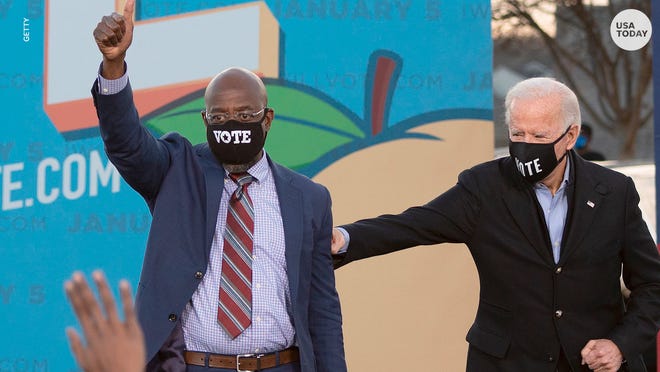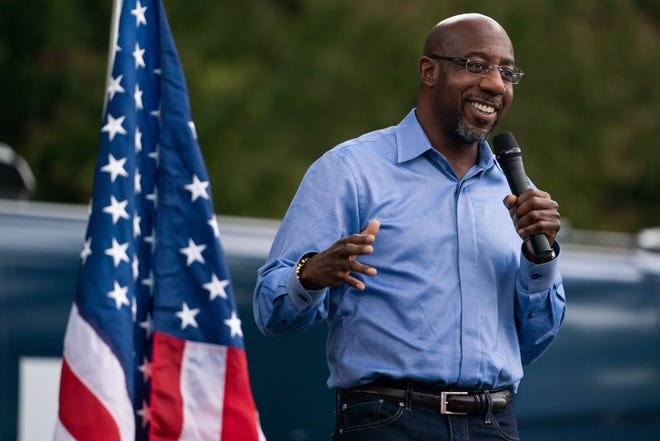Without expanding coverage through a comprehensive federal program, we will continue to watch Americans die from preventable, treatable conditions.
Now, as Congress works on a historic economic package that will revitalize our nation’s care infrastructure and move our economy forward, I’m still fighting to expand health care access for our neighbors who need it most.
This time, I’m doing it as a senator from Georgia, my home state, where state leaders have refused for years to expand Medicaid.
Building back better needs Medicaid
As work on the Build Back Better economic legislation continues, it is critical that this package contain provisions to provide comprehensive and stable health care to the over 4 million Americans, including more than 640,000 Georgians, who would qualify for Medicaid coverage if they lived almost anywhere else in our great nation.
In Georgia, and the 11 other states, partisan actors have refused to expand Medicaid. That means families with low incomes who reside in nonexpansion states, in one of the richest nations in the world, do not have access to reliable, affordable care simply because of where they live.
EDITORIAL:Cut Biden’s $3.5 trillion plan. Don’t make the perfect the enemy of America and its kids.
While there are several worthy health care proposals being considered that would improve quality of life for many families, it is the health care coverage gap that persists and poses the most dire and immediate threat to public health.


Those in the gap earn too much to qualify for Medicaid and too little to qualify for subsidies for marketplace plans.
This leaves them unnecessarily vulnerable and without quality health care coverage amid a once-in-a-generation pandemic that has claimed the lives of more than 700,000 Americans and over 22,000 Georgians.
This imperils us all because, as the pandemic reminded us, we are as close to one another in our humanity as a cough.
Politicians’ negligent refusal to take generous federal incentives that would allow them to expand their states’ Medicaid programs is not a sufficient reason to leave working families in the coverage gap, especially as communities navigate the new threat of the delta variant.
Democrats have long promised to make health care accessible to all Americans. In states like Georgia, where voters cast their ballots in historic numbers to reshape the makeup of our federal government, it is incumbent on Congress to honor that commitment by expanding access to Medicaid coverage in nonexpansion states. We know, without a doubt, that Medicaid saves lives.


In recent weeks, I’ve taken to the Senate floor to lift up the stories of Georgians who have paid the costs of Georgia’s refusal to expand Medicaid. One heartbreaking story in particular stays with me: Lorie Davis, a woman from Covington, fought as a health care activist to expand Medicaid while living in the coverage gap herself. Davis spent much of her life as a trauma nurse before leaving her profession due to a chronic pain condition, and eventually ended up unable to afford health insurance while working short-term restaurant gigs.
In most other states, Davis would have qualified for Medicaid. In Georgia, she was left uninsured.
Bascom and Jorwic:People with disabilities can’t go back to ‘normal’ after COVID. We need better.
When she fell ill in August 2020, in a nonexpansion state like Georgia, fear of excessive health care costs led Davis to delay seeking treatment. Sadly, she passed away the following month from pneumonia after a late-stage lung cancer diagnosis – a condition that could have been easily treated if caught earlier.
Access barriers cause early deaths
It is devastating to wonder what would have happened to Davis had she lived in Maryland, Arkansas or another state where she would have had access to preventative care and other essential benefits through Medicaid. Without expanding coverage to people like Davis through a comprehensive federal program, we will continue to watch Georgians – and other Americans – die from preventable, treatable conditions.
For countless hardworking people in my state and others, the question of expanding Medicaid is a matter of life or death.
It’s disturbing to observe how partisan politicians play games with federal programs that help working people survive and thrive. For instance, imagine how poor quality of life would be for countless families if Social Security, or Medicare, were only available to Americans in 38 states?
Millions of Americans living in nonexpansion states are being used as pawns in a cynical political game. Expanding Medicaid coverage in nonexpansion states like Georgia would drastically improve the nation’s health outcomes. Not to mention, this federal investment would keep rural hospitals in some of the country’s most vulnerable and underserved communities open, and bolster our local economies.
If Democrats believe health care is a human right, and if we want to save lives, Congress must prioritize including a comprehensive, stable Medicaid fix for nonexpansion states in the reconciliation package.
We have a chance, unlike any chance we have had before, to close the coverage gap and save lives. Now is the time to take it.
Raphael Warnock is a U.S. senator from Georgia. Follow him on Twitter: @SenatorWarnock




